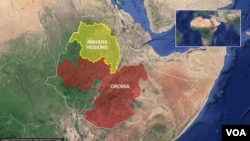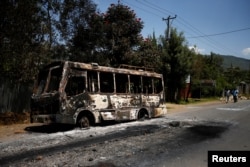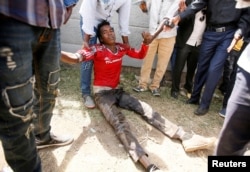Foreign-owned companies have become the latest targets of violence during the unrest in the Oromia region of Ethiopia.
Government officials are worried the violence could derail the country's economic growth, but analysts say addressing protesters' grievances is also key to maintaining the nation's upward economic trajectory.
"You cannot just focus on building the economy and talk about double-digit growth," said Anuradha Mittal, executive director of the Oakland Institute, a California-based policy group. "An economic model which is built on denying democracy, denying people basic human rights, isn't sustainable, and it will collapse."
Eleven factories and about 60 vehicles have been burned and destroyed in recent weeks as anti-government protests spread across the region, according to reports on state-owned television.
Prime Minister Hailemariam Desalegn has declared a six-month state of emergency to restore order, but hinted Tuesday it might be lifted early if the region could be stabilized. At a news conference Tuesday with German Chancellor Angela Merkel in Addis Ababa, he conceded the need for democratic reforms in the country, saying 49 percent of the population was not properly represented in the parliament.
Merkel voiced support for dialogue in the country and sympathy for the demands of the protesters. She relayed concerns from German companies about Ethiopia's business climate. Germany is one of the largest consumers of Ethiopia's products, such as textiles and coffee, buying 30 percent of coffee exports, according to Germany's foreign office.
Economic impact
Ethiopian Communication Affairs Minister Getachew Reda told journalists Monday that more than 90 percent of flower farms in an important economic corridor between Ziway and Hawassa in the Oromia region had been attacked, as well as textile and agriprocessing plants.
"What Ethiopia achieved in the last 15 to 20 years [is being destroyed] in the Oromia region," Reda said. "Civilian life has been attacked. They tried to create an ungoverned space."
These attacks on foreign-owned farms weren't the first. Last month, Dutch and Israeli farms came under attack by anti-government protesters.
Such attacks have caused some companies, including Dutch flower company Esmeralda Farms, to shut down operations. Another Dutch-owned fruit processing company that employed 2,000 people, Africa Juice BV, was set ablaze last week by protesters in Oromia.
Marjolein Busstra, spokeswoman for the minister for foreign trade and development of the Netherlands, told VOA that Dutch officials were in regular conversation with the Ethiopian government.
"[We] urge them to protect the safety of the people in those regions — not just the companies, everybody," she said. "We also urge them to enter into a dialogue with these groups that are conducting the attacks, because we think that there is a deeper, underlying conflict that is going on and repressing all the violence will not lead to a sustainable solution."
Left out of growth
Ethiopia has been hailed for its double-digit economic growth and its ability to weather even the global financial crisis of 2008. The country's robust growth earned it the nickname of the "African Lion," as it regularly topped the list of the fastest-growing economies in the world.
Recent development is attributed to investment and construction in the country, Gelila Woodeneh, World Bank communications officer, told VOA in a statement.
But the country's state development model is beginning to show cracks as people express anger at being left out of its ambitious development projects, Mittal said.
Her organization, the Oakland Institute, recently published a report titled "Miracle or Mirage? Manufacturing Hunger and Poverty in Ethiopia."
"In 2016, over 18 million people required food assistance in Ethiopia, a crisis attributed to El Niño-induced drought," said Mittal. "This narrative, while convenient for the government and its allies, ignores the chronic food insecurity in the country. Eight million to 18 million Ethiopians have depended on food or cash handouts for their survival each year over the last decade."
The protests that have erupted since November 2015 in the Oromia region began over a controversial government plan to expand the capital. The unrest forced the government to cancel the plan in January. But protesters' demands have broadened from land issues to human rights, lack of representation and lack of political participation of the Oromo ethnic group.
Some of the anger against foreign firms exists because their operations have pushed people off their land without producing promised jobs to locals, Mittal said.
"If I am a foreign investor, I look for opportunities. I understand that there are risks, but in the face of this growing unrest where foreign companies have been targets, given all that has happened in terms of displacement of people and their lands given away to foreign investors, it would be astute to not go into a country like that," Mittal said.







